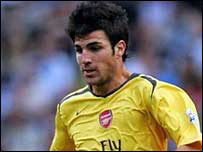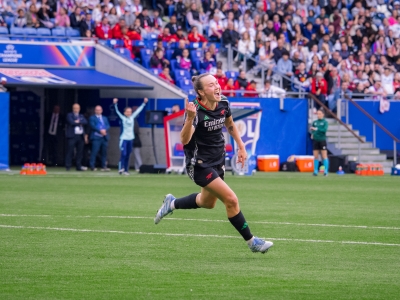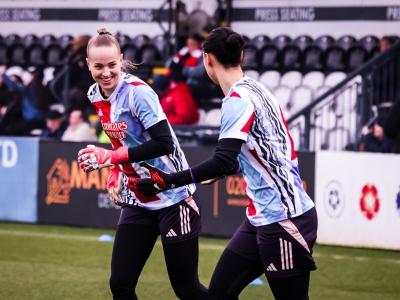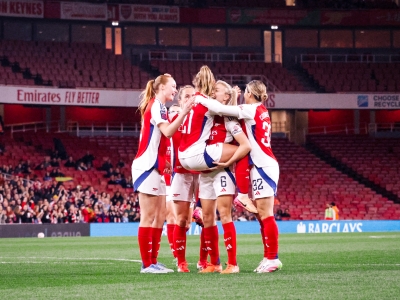There have been three iconic playmakers in Arsenal’s history. The first was Alex James, a rotund Scotsman from Mossend whom Herbert Chapman transformed from an inside forward to a midfield schemer - Wenger was not the first Arsenal manager to spot a player’s hidden talents. James was the heartbeat, modulator and metronome of that side and while he only scored 27 goals in 8 years, the prolific strike rate of Jack, Bastin and Hume would have been reduced significantly without the diminutive Scotsman’s assists. The 1930’s was Arsenal’s decade, and James’ decade: 4 league titles and 2 FA cups are unarguable facts.
The third was Dennis Bergkamp. For me, Dennis is the epitome of a Wengerian player: a perfect combination of aggression and style, an intuitive understanding of what is needed to win a game, the vision to execute it (his pass for Vieira’s goal at Stamford Bridge in 2004, a slide-rule ball that eliminated three Chelsea players, remains the finest I have ever witnessed), and the desire to better each execution with the next one. Bergkamp averaged 10 assists per season, but his contribution was so much more important than that. The highest praise for Bergkamp would be that Henry – a world class player in his own right – was better still with the Dutchman beside him. Van Persie, or whomever it is burdened with the task of following him, has an awesome reputation to emulate.
But it wasn’t always so: After a miserable season at Inter, there were genuine doubts as to whether Bergkamp had the mental strength to succeed. A slow and inconsistent start to his Arsenal career did not help and there were fears that, like the ‘Total Football’ of the generation before his, he was an aesthete who shared not only their style, but their sense of potential unfulfilled. His subsequent three league titles were not only a permanent reminder of what he contributed to the club, but also proof that there was an end product to his game. In doing so, Bergkamp helped Arsenal - but Arsenal saved Bergkamp.
The second, and perhaps best, was Liam Brady. Perhaps the finest passer of the ball in the modern era, Brady used to place a bucket on the halfway line in training, and drop a football into it from the goal-line some sixty yards away; a neat party-trick, but he ‘did it’ on the field as well and it was mainly due to his consistency that a distinctly average Arsenal side achieved the relative success of four cup finals in four years. However, it was that same mediocrity which led to only one trophy from four and if it was heartbreaking to see him go, his talent deserved a platform higher than a parsimonious board - reluctant to release funds (ring any bells?) - was willing to give. Juventus, with two successive scuddetos, proved right his decision to leave.
A fourth beckons. Cesc Fabregas is not quick, but never seems to be outpaced; he is not powerful, but is never outmuscled and he is not experienced, yet never seems fazed. His composure and importance to this Arsenal team belies his age, but is compounded by his signing of an unprecedented 8 year contract. That he will then just barely be reaching his peak is a mouth-watering prospect, but not a straightforward one. Although Brady did not make his debut until 1973, he signed schoolboy forms for the club in 1970. His arrival coincided with the winning of the Fairs Cup, quickly followed by the double. Those halcyon days must have seemed a distant memory when he broke into the first team two years after the double success. Equally, Cesc made his debut in 2003 but spent most of the season looking on in awe as the ‘Invincibles’ dispatched all before them. Consequently, a solitary FA cup success (and failure at the last hurdle in Europe) is thus far what binds both players’ Arsenal careers.
Success, measured by league victories, not only kept James and Bergkamp at the club, it helped cement their status. A lack of it and, regardless of the prestige of the manager or opulence of a new stadium, Cesc will leave. That is a certainty. Brady stands on one side of the divide; James and Bergkamp on the other. Fabregas remains in the centre; the direction he takes will be the yardstick by which this club’s true ambitions will eventually be measured.







